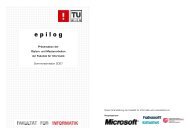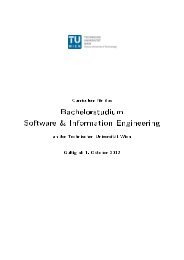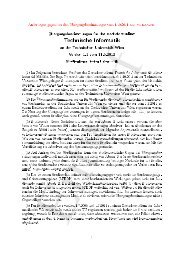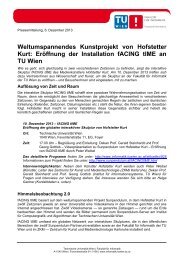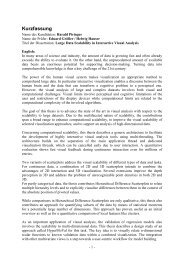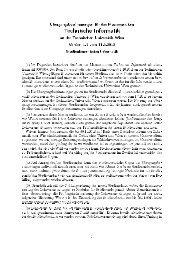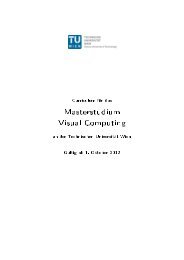Masterstudium Business Informatics - Fakultät für Informatik, TU Wien
Masterstudium Business Informatics - Fakultät für Informatik, TU Wien
Masterstudium Business Informatics - Fakultät für Informatik, TU Wien
You also want an ePaper? Increase the reach of your titles
YUMPU automatically turns print PDFs into web optimized ePapers that Google loves.
• Advanced nancial planning and control: Compliance requirements (IFRS, Capital<br />
Accord and COSO Integrated Framework); recognition, measurement, and management<br />
of pension obligation; integration of dynamic hedging strategies; advanced<br />
planning and control concepts; management information system: conceptualization<br />
and specication<br />
• Risk-based performance management: Compliance requirements (IFRS, Capital<br />
Accord and COSO Integrated Framework); capital and risk allocation strategies<br />
within decentrally organized enterprises with dierent risk categories; organizational<br />
structures of the risk-based performance management; employability and<br />
sustainability of risk based performance measures; management information system:<br />
conceptualization and specication<br />
Expected Prerequisites:<br />
The contents of the module SBA/FR1 - Advanced Financial and Risk Management 1 .<br />
Teaching and Learning Methods and Adequate Assessment of Performance: The module<br />
is organized along lectures, reading assignments in self organized acquisition of new<br />
knowledge, interactive sections through case studies, teamwork, and take-home exercises<br />
on an e-learning platform.<br />
Courses of Module:<br />
3.0/2.0 VU Advanced Financial Planning and Control<br />
3.0/2.0 VU Risk-based Performance Management<br />
SBA/ORG - Organization<br />
ECTS-Credits: 6.0<br />
Summary: What are organizations, how are they designed and how do they interact with<br />
their environment? These questions are simple but provoking. This module is aimed at<br />
giving students the possibility to discuss alternative answers to these question. It helps<br />
students to increase their abilities to understand complex organized behavior. It oers<br />
not only a series of dierent theoretical lenses useful for explaining organizations from<br />
multiple perspectives but also a set of tools to design and manage organizations. To<br />
a large extent the courses rely on experiential learning techniques including individual<br />
as well as team assignments, role plays and simulations in-class, group discussions, and<br />
presentations.<br />
Learning Outcomes:<br />
Knowledge:<br />
Skills:<br />
• Advanced knowledge in organization theory and advanced knowhow in the management<br />
of people and organizations<br />
50




